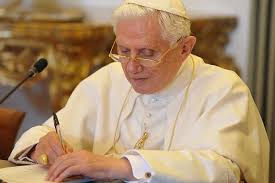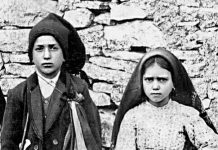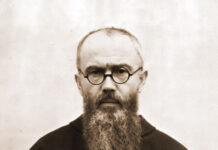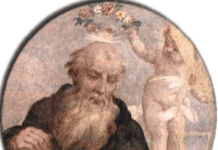BENEDICT XVI
GENERAL AUDIENCE
Saint Peter’s Square
Wednesday, 2 June 2010
Saint Thomas Aquinas
Dear Brothers and Sisters,
After several Catecheses on the priesthood and on my latest Journeys, today we return to our main theme: meditation on some of the great thinkers of the Middle Ages. We recently looked at the great figure of St Bonaventure, a Franciscan, and today I wish to speak of the one whom the Church calls the Doctor communis namely, St Thomas Aquinas. in his Encyclical Fides et Ratio my venerable Predecessor, Pope John Paul II, recalled that “the Church has been justified in consistently proposing St Thomas as a master of thought and a model of the right way to do theology” (n. 43). It is not surprising that, after St Augustine, among the ecclesiastical writers mentioned in the Catechism of the Catholic Church St Thomas is cited more than any other, at least 61 times! He was also called the Doctor Angelicus, perhaps because of his virtues and, in particular, the sublimity of his thought and the purity of his life.
Thomas was born between 1224 and 1225 in the castle that his wealthy noble family owned at Roccasecca near Aquino, not far from the famous Abbey of Montecassino where his parents sent him to receive the first elements of his education. A few years later he moved to Naples, the capital of the Kingdom of Sicily, where Frederick II had founded a prestigious university. Here the thinking of the Greek philosopher Aristotle was taught without the limitations imposed elsewhere. The young Thomas was introduced to it and immediately perceived its great value. However, it was above all in those years that he spent in Naples that his Dominican vocation was born. Thomas was in fact attracted by the ideal of the Order recently founded by St Dominic. However, when he was clothed in the Dominican habit his family opposed this decision and he was obliged to leave the convent and spend some time at home.
In 1245, by which time he had come of age, he was able to continue on the path of his response to God’s call. He was sent to Paris to study theology under the guidance of another Saint, Albert the Great, of whom I spoke not long ago. A true and deep friendship developed between Albert and Thomas. They learned to esteem and love each other to the point that Albert even wanted his disciple to follow him to Cologne, where he had been sent by the Superiors of the Order to found a theological studium. Thomas then once again came into contact with all Aristotle’s works and his Arab commentators that Albert described and explained.
In this period the culture of the Latin world was profoundly stimulated by the encounter with Aristotle’s works that had long remained unknown. They were writings on the nature of knowledge, on the natural sciences, on metaphysics, on the soul and on ethics and were full of information and intuitions that appeared valid and convincing. All this formed an overall vision of the world that had been developed without and before Christ, and with pure reason, and seemed to impose itself on reason as “the” vision itself; accordingly seeing and knowing this philosophy had an incredible fascination for the young. Many accepted enthusiastically, indeed with a-critical enthusiasm, this enormous baggage of ancient knowledge that seemed to be able to renew culture advantageously and to open totally new horizons. Others, however, feared that Aristotle’s pagan thought might be in opposition to the Christian faith and refused to study it. Two cultures converged: the pre-Christian culture of Aristotle with its radical rationality and the classical Christian culture. Certain circles, moreover, were led to reject Aristotle by the presentation of this philosopher which had been made by the Arab commentators. Avicenna and Averroës. Indeed, it was they who had transmitted the Aristotelian philosophy to the Latin world. For example, these commentators had taught that human beings have no personal intelligence but that there is a single universal intelligence, a spiritual substance common to all, that works in all as “one”: hence, a depersonalization of man. Another disputable point passed on by the Arab commentators was that the world was eternal like God. This understandably unleashed never-ending disputes in the university and clerical worlds. Aristotelian philosophy was continuing to spread even among the populace.
(To continue reading, please see here).












